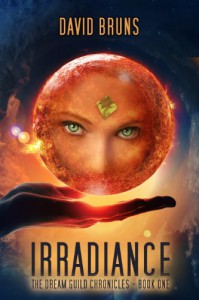Tracing The Stars
I read mostly science fiction and romance, and often a combination of the two.
Book Review: Irradiance-Excellent scifi with classic Utopian vibes I’d been missing

You may note how I am emphasizing the word “classic” when calling this book a Utopian. We’ve almost forgotten what the difference is between Utopian and Dystopian in science fiction, and the recent inundation of dystopian books hasn’t helped. Many of them are actually utopian, but have been improperly categorized because dystopian is the hot buzz-word the same way paranormal was five years ago, and magical fantasy was five years before that.
Classic utopianism in science fiction has roots with George Orwell, Aldous Huxley and Margret Atwood. They set the stage with a perfectly constructed society that functions in a state of utopia, then the book (through story and characters) slowly peels back the pristine paint to show the gritty truth and layers of hidden wallpaper underneath. I love classic Utopian. It’s my favorite genre. I wasn’t aware that’s what Irradiance was when I started, but I was in for a most lovely surprise.
The blurb for Irradiance reads like it might be utopian, but I’ve been disappointed so often recently by the blurb being better than the book, or ending up with yet another ‘teenage love-triangle dystopian’ blech. I went in with a deep breath, a bit of hope and simply expecting some science fiction. Right off the bat, I was reminded of Atwood. Then, a chapter later- hints of Huxley. A few chapters later, and there... there was the Orwell.
I smiled. I exhaled. I read on in bliss.
Bringing up my three favorite authors in the genre is not my way of saying the author, Bruns, was trying to mimic them – far from it. He has a strong voice all his own; but it’s impossible to write in this genre with out shadows and ghosts of those classical writers following your words – if you do it well. And, Bruns did it very well. I am now a Bruns reader for life.
The opening was a bit confusing. It’s one of those openings that makes more sense in the next chapter than it does as it is taking place. I can see how a few readers may set the book down, but I encourage you to read on into chapter 3 before deciding.
The book does have the expected hallmarks of a classical utopian – the overseer, the community, the breeding program, the secret society and the awakening of the character’s understanding that Utopia comes with a price. This can make it a touch predictable, but interwoven into this are some unique ideas that keep it unpredictable enough to be enjoyable.
I recommend this book for anyone who loves classic utopian sci-fi.
I was provided a copy by the publisher with the request for honest feedback.


